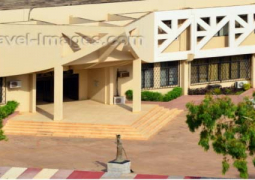Health officials at the National Malaria Control Program under the Ministry of Health and Social Welfare has spoke on the Current malaria prevention strategies in The Gambia at a sensitization meeting for Journalists to update them on the relevant knowledge in malaria prevention and control. In her presentation Mrs Olimatou Kolley, Program Officer at the National Malaria Control Program dilated on the consequences of malaria in Pregnancy which she said are caused by febrile illness, cerebral malaria Hypoglycemia, Anemia 2-15% and maternal death.
She pointed out some of the reasons why pregnant women are vulnerable to malaria infection; among them includes:
* Reduced immunity as a result of certain physiological changes during pregnancy.
* The placenta offers an advantageous location for adhering (sequestration) of parasites.
* Many infected women present with zero peripheral parasitaemia (asymptotic) and significant placental load.
* The sequestration of parasites in the placenta impede oxygen-nutrient transfer and cause interpreting growth retardation.
Commenting on the Intervention strategies for Malaria in Pregnancy (MIP), Mrs Kolley added that in order to reduce the adverse consequences of malaria during pregnancy, the WHO recommended three pronged approach which includes the use of:
1. Insecticide treated bed nets.
2. Appropriate case management.
3. Intermittent preventive treatment in the pregnancy (IPTP).
She stated that Intermittent Preventive Treatment Dose should be timely and
* All pregnant women should receive at least two doses of IPT after quickening, during routinely scheduled ANC visit.
* Presently, the most effective drug for IPT is sulhadoxine pyrimenthamine 25mg
* The interval between the first and the second dose should at least four weeks
* Health care providers should disperse dose and directly observe client taking dose ( DOT strategies)
She highlighted some of the Achievements the programme registered in the area of malaria prevention and control over the past years, noting that there is a decline of malaria morbidity in the county. She stated that a high political commitment and support is given to the programme by the government, adding that IPT information has now been included in the Health Management Information System (HMIS), increased capacity building of health workers, high awareness of malaria control and prevention during pregnancy, among others things.
On the challenges, she outlined the low uptake of the second dose of SP, late booking and irregular antenatal clinic attendance, reluctance to take fansidar by pregnant women, inadequate knowledge on the consequences of the malaria during pregnancy and benefit of ANC. She also outlined the inadequate skilled manpower, limited male participation in malaria prevention control activities.
Mr Bala Kandeh, Senior Program Officer NMCP revealed that malaria is caused by plasmodium parasites and transmitted by the bite of an infected female anopheles mosquito.
According him, malaria is one the most serious and complex health problems facing humanity in the 21st century adding that malaria is present in 102 countries of the world. It is mainly present in tropical and sub tropical countries in Africa, Latin American and Asia, adding that malaria kills more than one million people each year mainly children under five years.
He said 3000 people die from malaria each day and ten new cases every second.
On the determinant of malaria, he pointed out the host (human), vector (mosquito), environmental (humanity) availability of suitable vectors Gambiae that derive its name in the Gambia and found in Gorge town, adequate temperature and humidity.
On the factors contributing to malaria burden, Mr. Kandeh stated that these among others include drug resistance, insecticides resistance, increase in war and civil resistance, movement of refugee populations from one region to another, environmental changes, irrigation of rice fields, road construction and dams.





